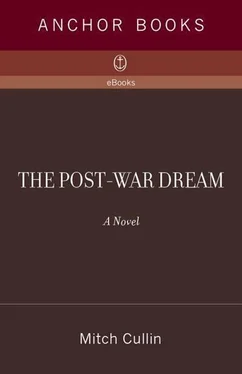“Of course,” he answered. “Of course,” he repeated, his voice suddenly trembling, watching as the bluebird became diffused with the welling of tears and seemed to flutter above him.
The spade acts as a snowplow, clearing the precarious spaces between golden barrels, succulents, and old man cereus. The funneling system which Hollis designed along the rooftop gutters — a series of black plastic tubing and sheet-metal rivulets — is hampered by blockages of ice. Below the funneling system — close to where he is working — the fifty-gallon tub which normally collects rain during the summer monsoon season now contains slush, as does the five-gallon bucket he uses for retrieving water from the tub to irrigate his flowering plants (scarlet betony, yellow bells, columbine). The trailing rosemary near the back patio is nowhere to be seen — lost beneath a melting stratum of white — yet a single cottontail rabbit sniffs at the ground there, unconcerned by Hollis's proximity while it searches for something to gnaw on. Taking a break to stare beyond his property, Hollis is aware of the rabbit but gives it little notice, for he has previously encountered more impressive kinds of free-roaming wildlife behind the house — a covey of quail, solitary coyotes, a pack of javelinas, a hawk, and an owl.
As no walls or fences enclose the yards of Nine Springs, he can peer into neighboring gardens, observing the mini-oases growing around his own refuge — backyards which, in warmer months, showcase bougainvillea and cape honeysuckle vines, wide-spreading palo verdes and hybrid mesquites for cool summer shade, creosote bushes, prickly pears, cholla cacti, and red yuccas whose clusters of bright flowers entice both hummingbirds and butterflies; he can, when surrounded by such subtle desert shapes and colors, perceive this gated community as a kind of barren paradise, a well-deserved reward for almost forty years of service to the Dusenbury-Soper Lumber Company (that majority of his lifetime spent overseeing cutting rights, production, and processing in Pennsylvania and, then, Southern California).
In truth, Hollis's thoughts concerning Nine Springs rarely waver, nor do his concerns usually align with Lon's mixed feelings about the place; he has never been able to equate his retirement here with some exclusive theme park for the aged, a present-day dystopia built from antiquated, homogenous ideals. Instead, he feels the community is not so different from the valued destinations of his youth, holiday retreats like Palm Springs or Lake Tahoe — unique getaways which allowed couples to leave the steady drone of urban motion and, for a brief period, find peace in wide-open, slower-paced environs; without such halcyon alternatives made available, he believes many decent people might find their twilight years to be somewhat less fruitful.
Debra, too, had sought contentment here, while also embracing the motto of “living with cancer” as a personal mantra. Shrugging off the cruel timing of her illness — the late stage of her disease, the exhaustion of chemotherapy, her declining health — she, like Hollis, was still determined to enjoy what was supposed to have been prolonged recompense for those laborious, gainful decades. As she saw it, his retirement signaled her retirement, at least to some extent; so it wouldn't be all pain and sickness for her, nor did she continue to play the role of a restive and childless San Gabriel Valley homemaker, or that of a part-time sales associate at Mervyn's. Rather, she quietly redefined herself upon leaving California, seeking an appropriate analogue to her husband's almost daily rounds of golf, finding her answer inside the meeting rooms of the Funtivities Center — where she attended a weekly lecture series on the religions of the world, engaged in several lively debates regarding current events, and learned how to research the genealogy of her family tree.
Immediately following her surgery and prior to becoming too weak to participate, Debra often passed entire days at the Funtivities Center: mornings practicing tai chi, afternoons doing ceramics, and, for a short while, evenings rehearsing with the Ol’ Settlers Drama League (the effects of chemo at last preventing her from performing as Mrs. Gibbs in Our Town , or realizing the dream of tackling Rosie DeLeon in Bye Bye Birdie ). And although she had once fostered a desire to raise her own children — a desire left unfulfilled due to the double-edged revelation that her body had been overloaded with androgens and her husband's sperm were abnormally shaped — Debra tended to herself at Nine Springs in the manner which, Hollis imagines, she might have done for a child raised under her supervision: balanced meals, regular exercise, hours devoted to reading or studying, and plenty of extracurricular distractions to keep negative influences and ennui at bay. Nevertheless, with the disease's progression, she couldn't help but view her premenopausal infertility — the abundance of male hormones complicating her system, the irregular periods, the difficulty she had had ovulating — as being, in hindsight, a clear warning for what lay ahead.
Yet only after Dr. Langford's diagnosis did Debra learn about the studies which suggested a connection between ovarian cancer and never having children. Still, she had remembered sensing minor pangs while ovulating, that mid-cycle sensation her gynecologist at the time had called Mittelschmerz — that moment when a single egg expanded, bursting beside the ovary, awaiting either fertilization or to be flushed away with menstruation. Not until her cancer was discovered, though, would she consider the damage inherent to such a routine, commonplace function: for with every egg which ruptured near the ovary came a division of cells — a shifting, a multiplying, a regrouping along the surface lining to seal the gap; and it was that mechanical, automatic dividing and subsequent repair which could allow rogue cells to go astray, producing the microscopic starting point for cancerous beginnings.
“You know what I really hate, what I really can't stomach?” she'd said to Hollis, as they paced the hallways of the cancer center. “It's knowing my body is operating on its own internal clock. Early on it decides I shouldn't have a baby. Then it decides to change my hair color. Then it decides to wrinkle me all over. Now it wants to kill me, and there isn't a damn thing I can do to reset it, or make it stop tick-tocking my life away. That really pisses me off.”
But at least she had her mind, he countered. At least she could control her thoughts, in spite of what her body was doing.
“You're right,” she said. “I guess I can still evolve in a positive direction, even if the rest of me is rapidly decaying. So if nothing else, my brain is on my side.”
“Me and your brain,” he reminded her.
“Forgive me. I stand corrected.”
A fairly recent development in Debra's ongoing evolution was the avoidance of beef and fatty foods, relying instead on a diet of soy products, organic vegetables, chicken breasts, and brown rice. This conversion began when she watched a CNN special report about mad cow disease; soon afterward, while she was asleep in their bed, the disturbing images of infected, spasmodic cattle and humans repeated in her mind, jolting her awake beside Hollis.
“No more beef,” she had announced, nudging him with an elbow: “Hey, no more beef. We can't eat it anymore.”
“What is it?” he said, only half conscious.
“Bovine spongiform encephalopathy.”
“What are you saying?”
“It's cannibalization. They're using meat in stock feed. They're feeding them to themselves.”
“I don't understand.”
“Cows are eating cows, and we're eating the cows that do that, and it's coming back to haunt us. People are dying because of it, and they don't know why for sure. But it's pretty obvious, we ‘re paying a price for toying with nature. Stuff like this always happens when we go against the natural order of things, right? So, please, promise me — no more beef.”
Читать дальше










![Theresa Cheung - The Dream Dictionary from A to Z [Revised edition] - The Ultimate A–Z to Interpret the Secrets of Your Dreams](/books/692092/theresa-cheung-the-dream-dictionary-from-a-to-z-r-thumb.webp)

